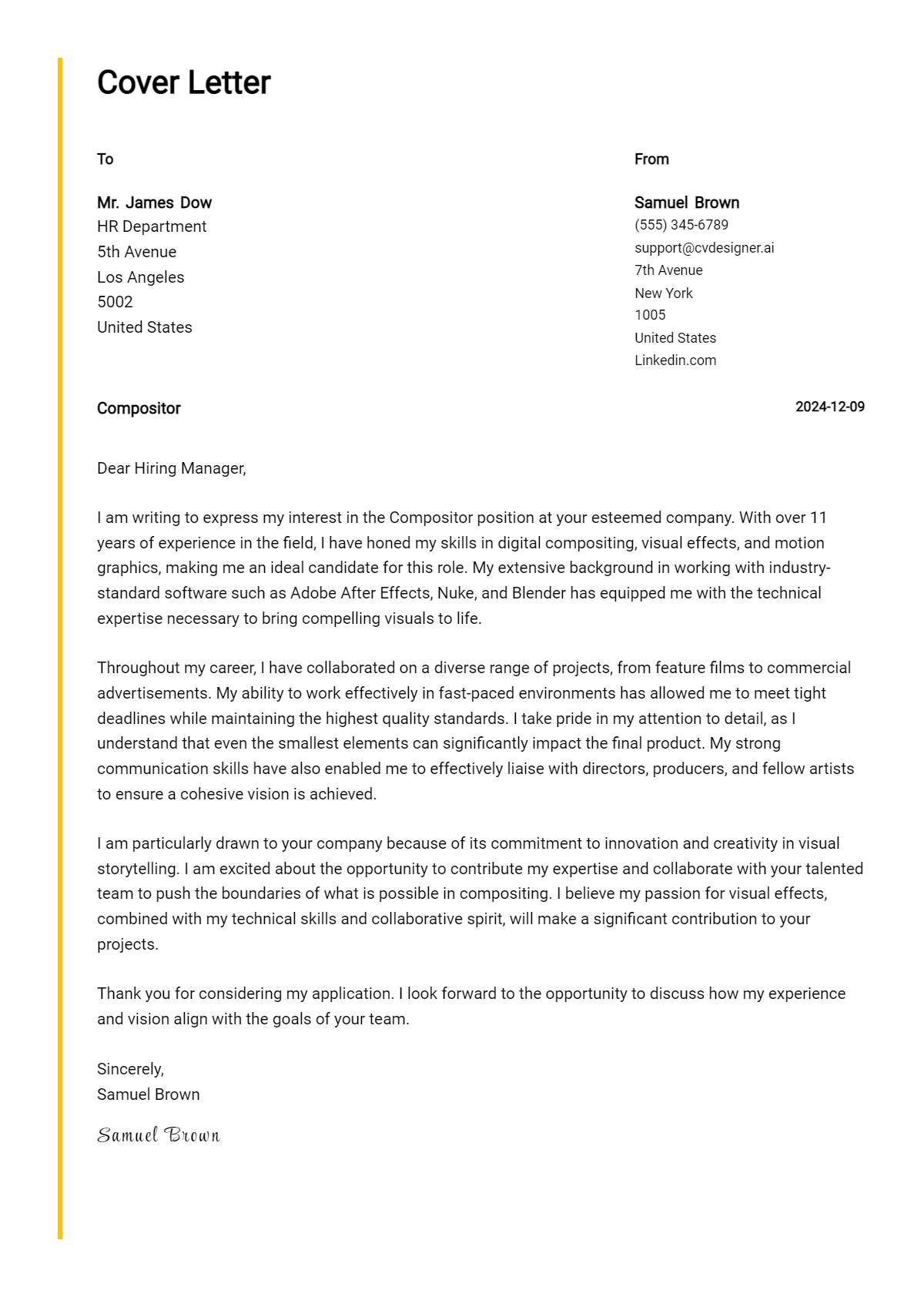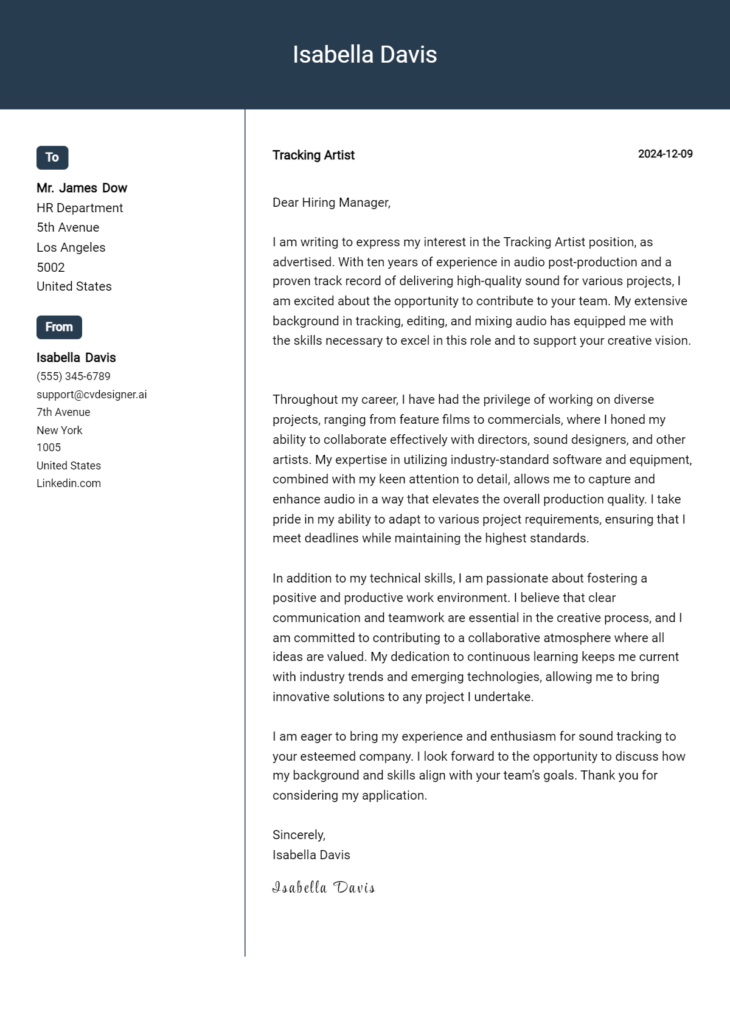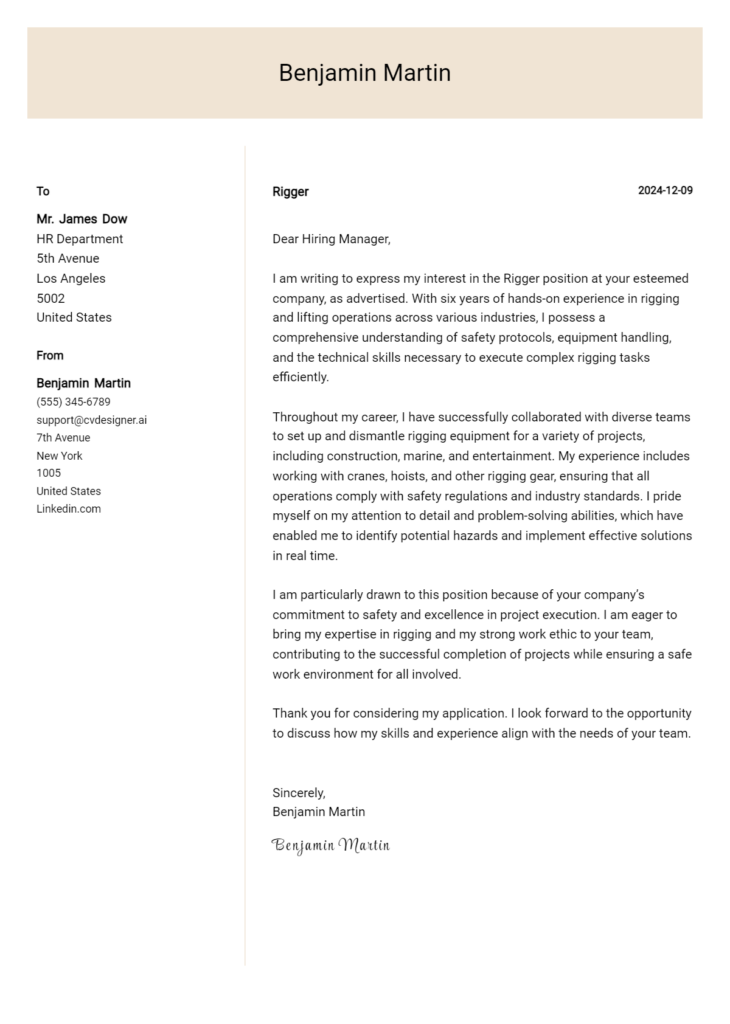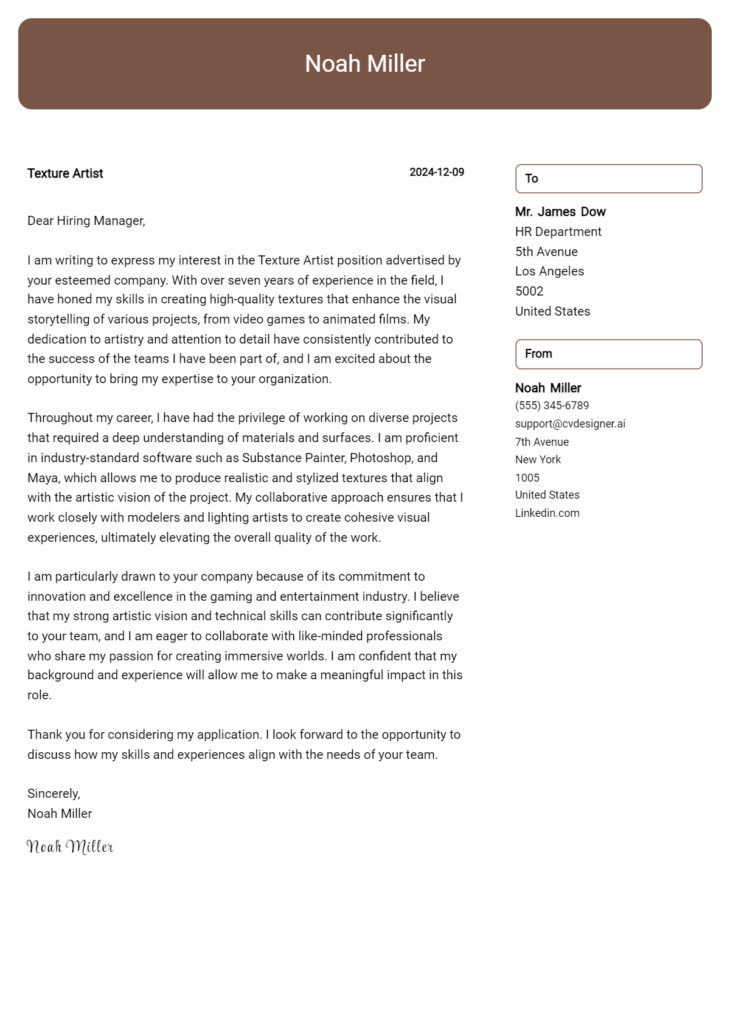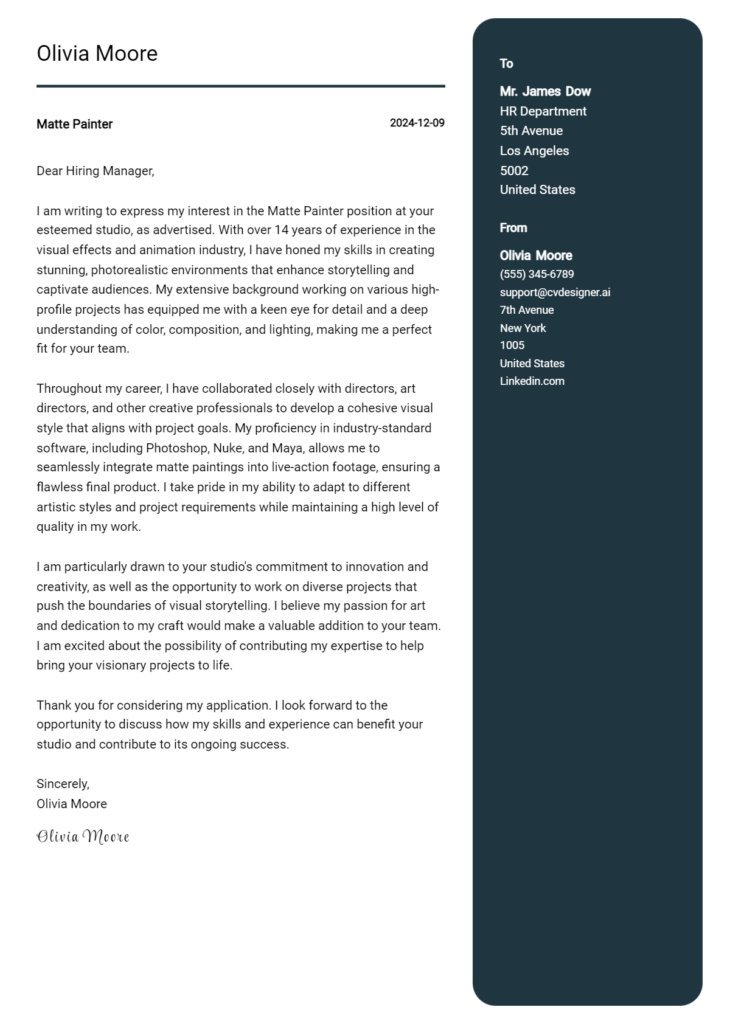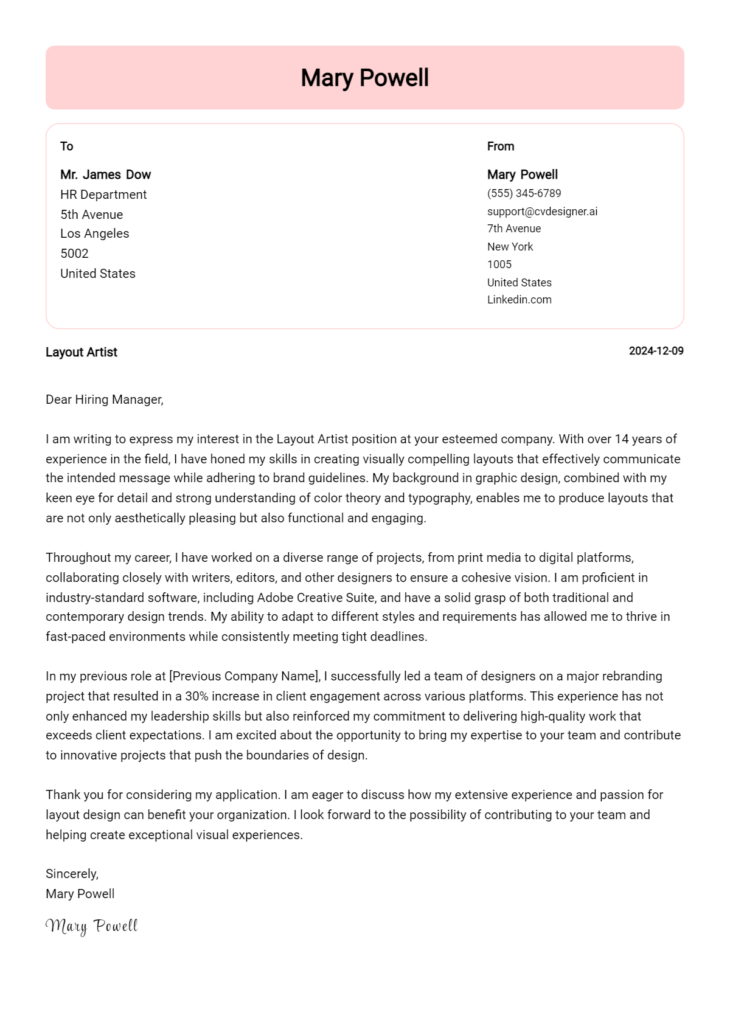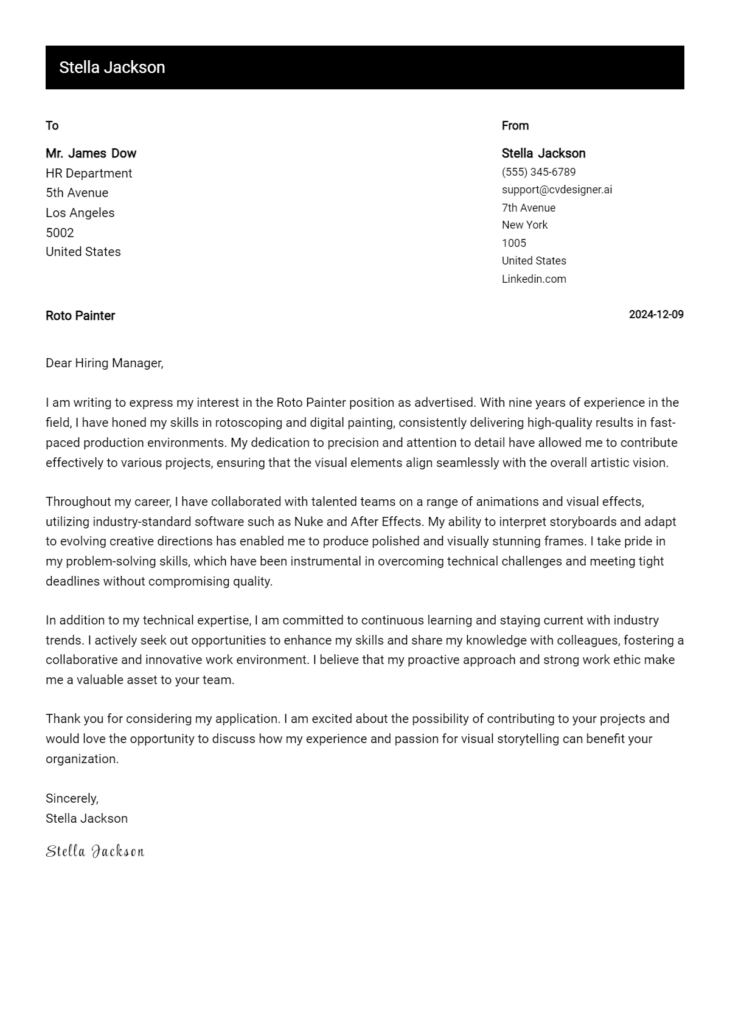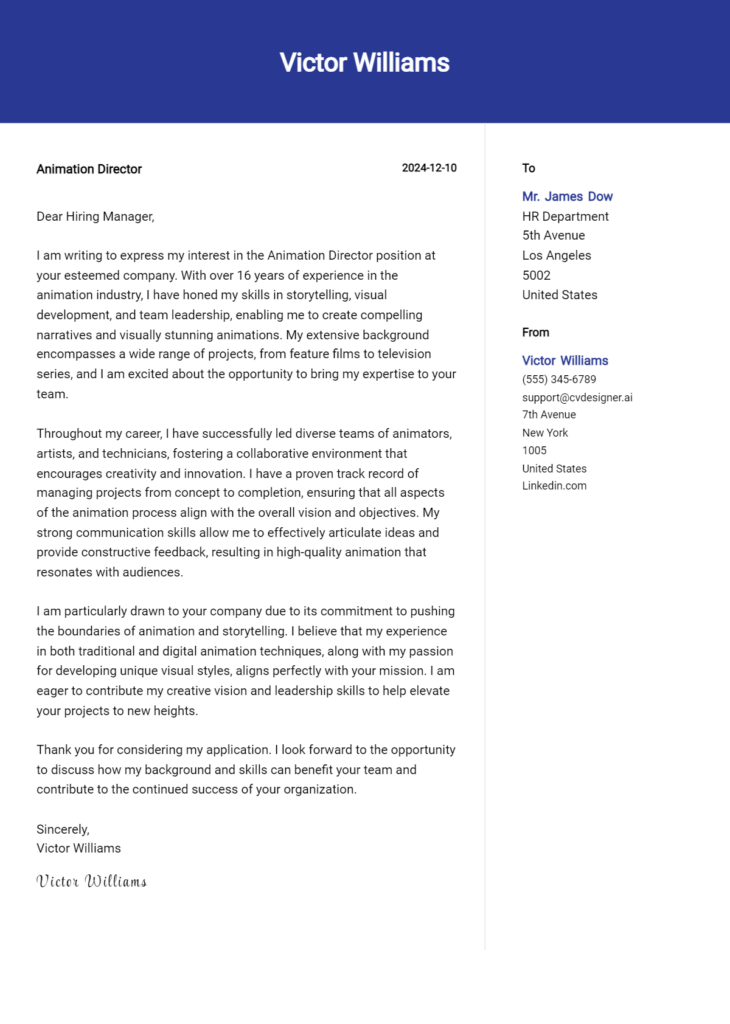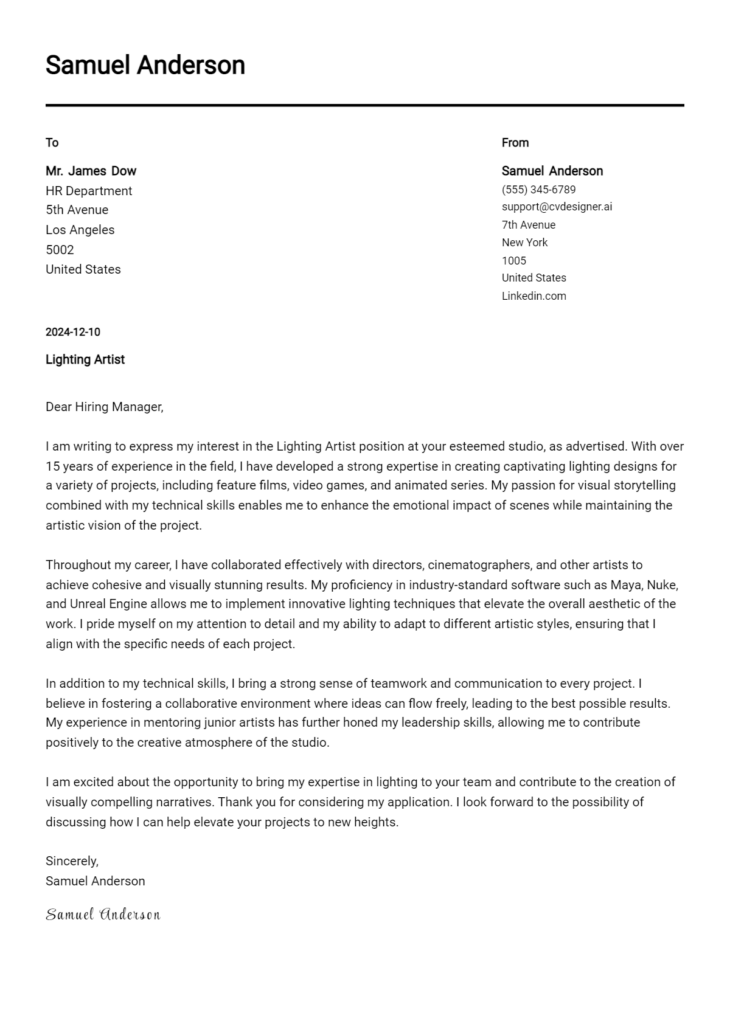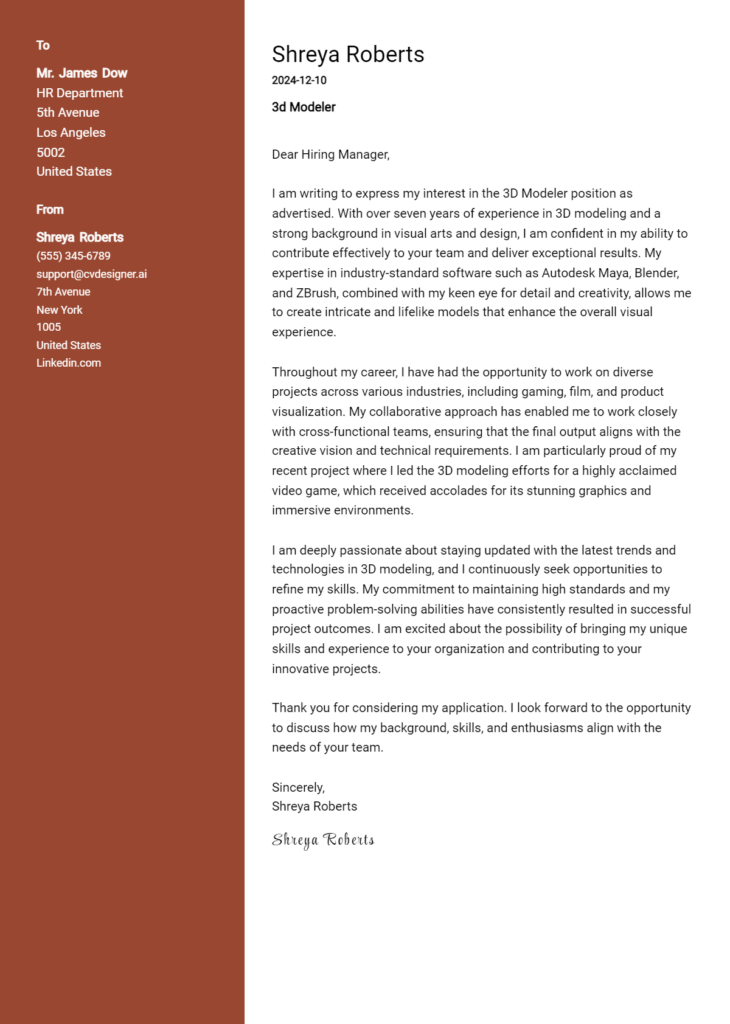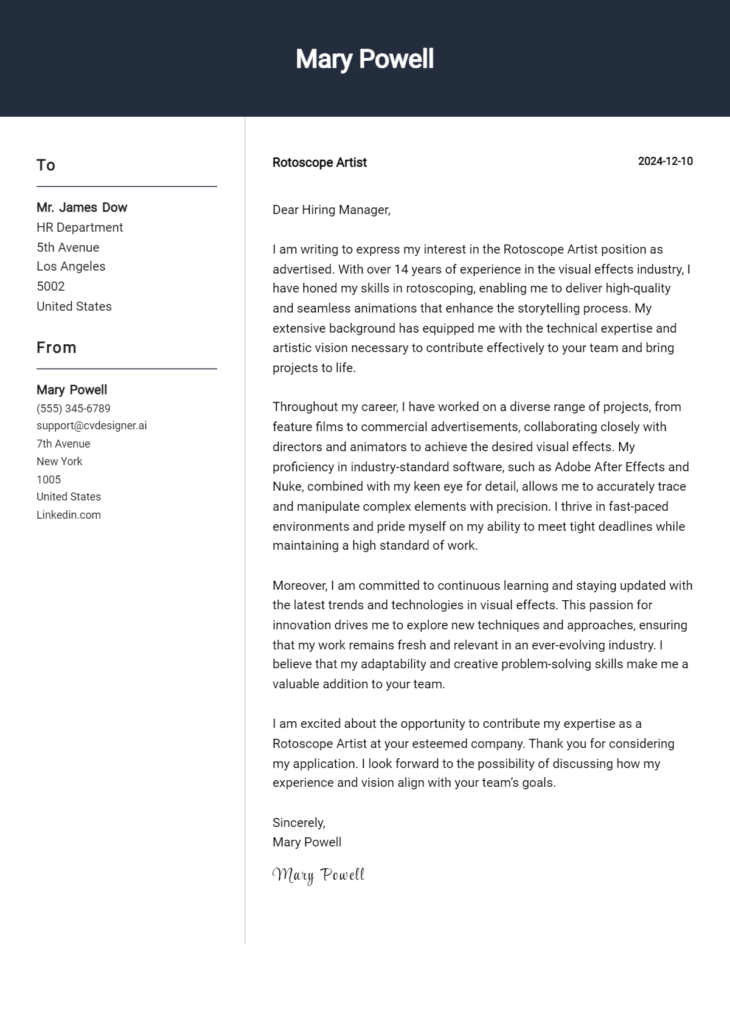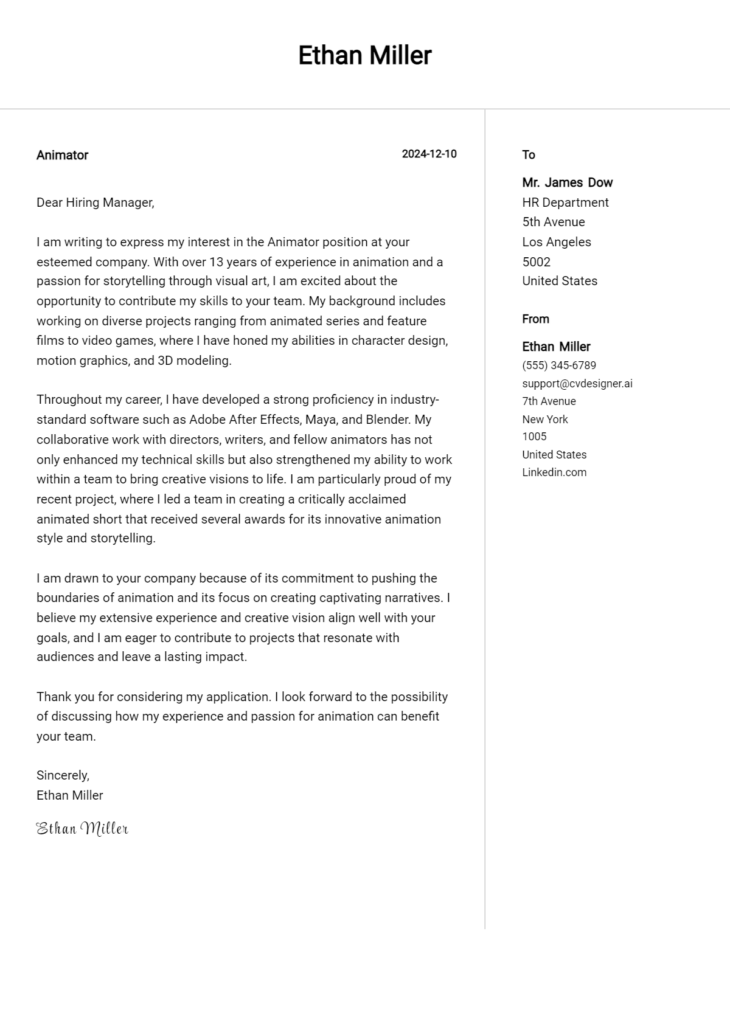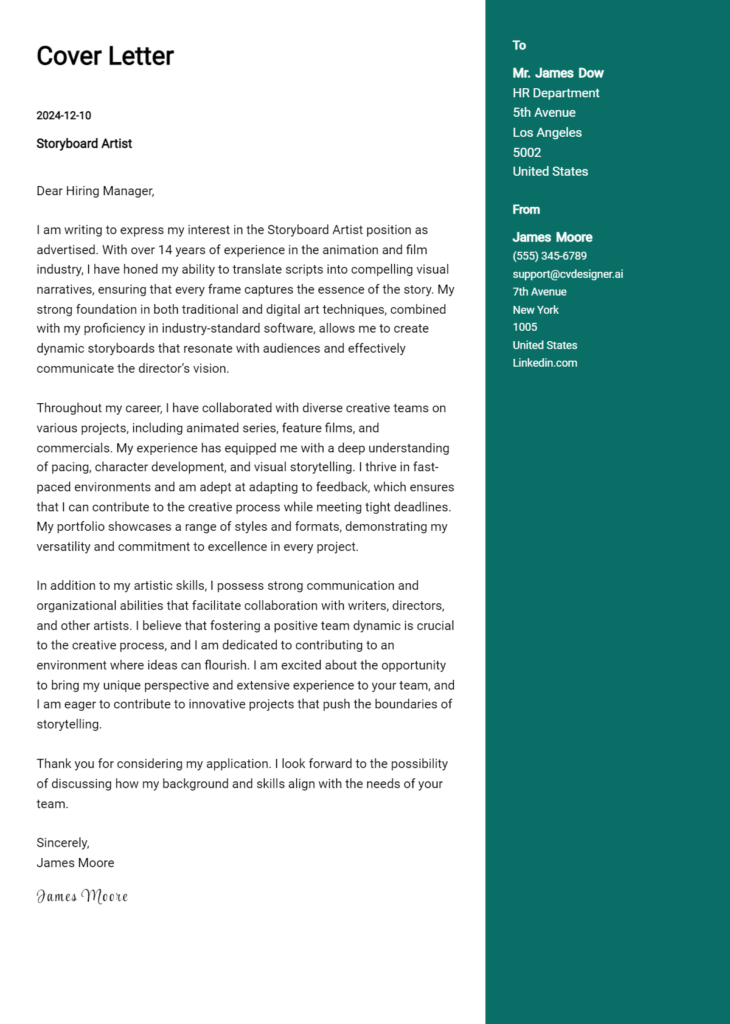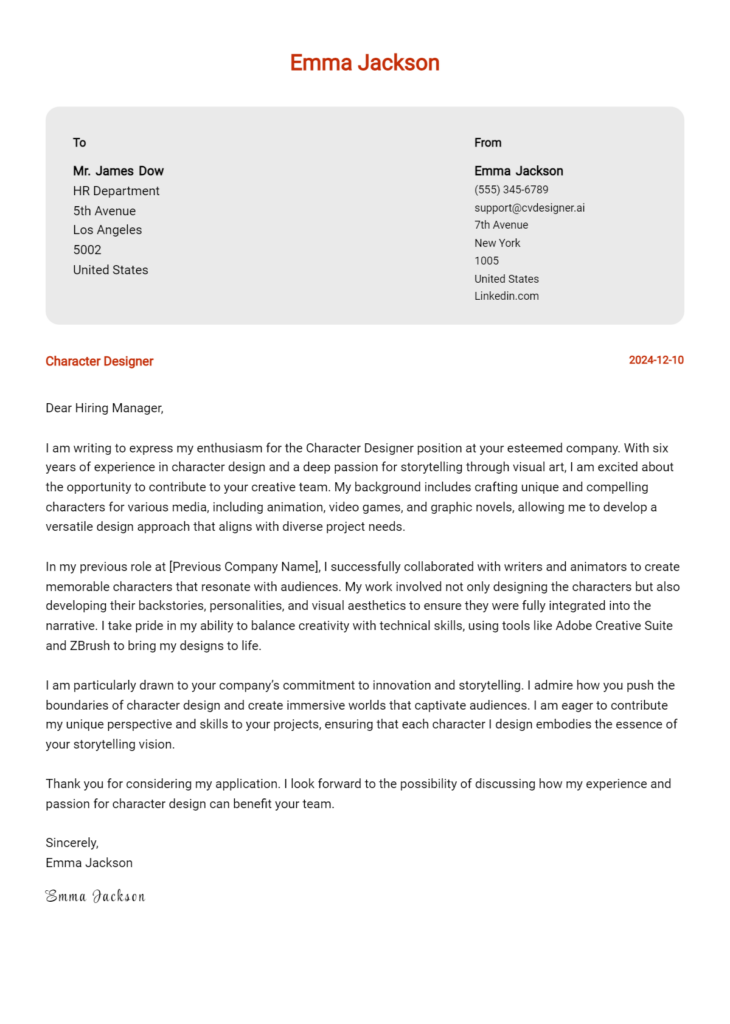Compositor Cover Letter Examples
Explore additional Compositor cover letter samples and guides and see what works for your level of experience or role.
How to Format a Compositor Cover Letter?
Crafting a compelling cover letter is essential for a Compositor, as it serves as a reflection of your creative skills and technical proficiency. The way you format your cover letter not only showcases your artistic eye but also demonstrates your ability to communicate effectively—an essential skill in the world of visual effects and animation. A well-structured cover letter captures the attention of hiring managers, highlighting your attention to detail and understanding of the industry.
In this guide, we will explore how to structure your cover letter, focusing on the specific needs of a Compositor. We’ll cover the following essential components:
- Cover Letter Header
- Cover Letter Greeting
- Cover Letter Introduction
- Cover Letter Body
- Cover Letter Closing
Each section is crucial in presenting your qualifications and professionalism. Let's delve into each part to ensure your Compositor cover letter stands out in a competitive field.
Importance of a Cover Letter Header for a Compositor
The header of a cover letter is a crucial component that sets the tone for the entire document. For a Compositor, clarity and professionalism in the header are paramount, as they convey the candidate's attention to detail and organizational skills—qualities that are essential in the visual effects and animation industries. The header should include the applicant's contact information, the date, and the recipient's details. A well-structured header not only enhances the overall presentation of the cover letter but also ensures that the recipient has all the necessary information at a glance.
Strong Example
John Doe 1234 Animation Lane Los Angeles, CA 90001 john.doe@email.com (123) 456-7890 [Date: October 1, 2023] Jane Smith Hiring Manager Creative Studio 5678 Film Blvd Los Angeles, CA 90002
Weak Example
john doe los angeles john@email 10/1/23 jane studio
The Importance of the Cover Letter Greeting for a Compositor
The greeting of your cover letter serves as the first impression and sets the tone for the entire letter. A well-crafted opening not only introduces you to the hiring manager but also demonstrates your professionalism and attention to detail. By addressing the hiring manager directly, you personalize your application, showing that you have taken the time to research and connect with the organization. Avoiding generic greetings like "To Whom It May Concern" can make a significant difference in how your application is perceived. If you are unsure of the recipient's name, take a moment to look it up on the company's website or LinkedIn profile. This small effort can enhance your credibility and show your enthusiasm for the position.
Strong Greeting Example
Dear Mr. Smith,
Weak Greeting Example
To Whom It May Concern,
The Importance of a Compelling Cover Letter Introduction for a Compositor
A well-crafted cover letter introduction is vital for a Compositor, as it sets the tone for the entire application and serves as an opportunity to make a powerful first impression. This introduction should capture the hiring manager's attention, clearly express the candidate's enthusiasm for the role, and succinctly highlight relevant skills or achievements that align with the job requirements. A strong introduction not only piques interest but also establishes the candidate as a qualified contender for the position. Below are examples of both a strong and a weak introduction to illustrate this point.
Strong Example:
Dear [Hiring Manager's Name], I am thrilled to apply for the Compositor position at [Company Name], where I can leverage my over five years of experience in visual effects and digital compositing. My passion for storytelling through visuals, combined with my proficiency in software like Nuke and Adobe After Effects, has allowed me to contribute to award-winning projects that resonate with audiences. I am eager to bring my expertise in creating seamless and stunning visuals to your talented team.
Weak Example:
Hello, I saw the job posting for a Compositor and thought I would apply. I have some experience in editing and compositing. I hope I can be a good fit for your company.
Purpose of the Cover Letter Body for a Compositor
The cover letter body for a Compositor serves as a crucial platform for candidates to articulate their unique skills, experiences, and the value they bring to a prospective employer. This section should effectively highlight specific projects or accomplishments that demonstrate the candidate's technical proficiency and creative vision. By detailing relevant experiences, such as contributions to notable films or advertising campaigns, the candidate can convey their ability to harmonize various visual elements into a cohesive and captivating final product. This not only showcases their artistic talents but also their understanding of the collaborative nature of the industry, making a strong case for their fit within the company.
Strong Example
Dear [Hiring Manager's Name], I am excited to apply for the Compositor position at [Company Name]. With over five years of experience in visual effects and compositing, I have had the opportunity to work on award-winning projects, including the critically acclaimed film "Imaginary Realms," where I was responsible for integrating live-action footage with complex CGI elements. My proficiency in software such as Nuke and After Effects allowed me to create seamless transitions that enhanced the storytelling while maintaining visual integrity. Additionally, my role in the commercial for "Brand X" involved collaborating closely with directors and animators to ensure the final output met the highest standards. I am confident that my strong attention to detail and ability to work under tight deadlines will contribute significantly to your team's success. Sincerely, [Your Name]
Weak Example
Dear [Hiring Manager's Name], I am writing to apply for the Compositor role at [Company Name]. I have some experience in compositing and I think I can do well in the job. I have worked on a few projects, but I can't remember the names of all of them. I know how to use programs like Nuke and After Effects, which I think are useful for this position. I believe I would be a good fit for your team. Best, [Your Name]
Importance of the Cover Letter Closing for a Compositor
The closing paragraph of a cover letter is crucial as it serves to summarize your qualifications, reiterates your interest in the compositor role, and encourages the hiring manager to take the next steps, such as reviewing your resume or scheduling an interview. A strong closing leaves a lasting impression and emphasizes your enthusiasm for the position, while a weak closing may fail to convey your eagerness, potentially diminishing your chances of being invited for an interview.
Strong Example
Thank you for considering my application for the Compositor position at [Company Name]. With my extensive experience in visual effects and my passion for creating stunning imagery, I am excited about the opportunity to contribute to your talented team. I look forward to the possibility of discussing how my skills align with your needs and how I can help bring your projects to life. Please feel free to review my attached resume, and I hope to hear from you soon to schedule an interview.
Weak Example
I guess that's it for my application. I hope you look at my resume. I would like to work for your company, but I understand if you choose someone else. Thanks.
Crafting a compelling cover letter is crucial for Compositor candidates looking to make a strong impression in the competitive field of visual effects and animation. Your cover letter should not only highlight your technical skills and problem-solving abilities but also demonstrate your understanding of the software development life cycle (SDLC), your capacity for teamwork, and your passion for continuous learning. Here are some tips to help you create an effective cover letter that stands out.
Tips for Writing an Effective Cover Letter for a Compositor
Showcase Your Technical Skills
Clearly outline your proficiency with industry-standard software such as Adobe After Effects, Nuke, or Fusion. Mention specific tools or techniques you are skilled in, as this will demonstrate your readiness for the role. Providing examples of projects where you successfully applied these skills can further strengthen your case.Highlight Problem-Solving Abilities
Compositing often involves overcoming technical challenges. Share a specific instance where you encountered a problem during a project and explain how you resolved it. This not only shows your critical thinking skills but also your resilience and ability to work under pressure.Demonstrate SDLC Knowledge
Understanding the software development life cycle is essential for a Compositor. Briefly discuss your familiarity with the stages of SDLC and how you’ve applied this knowledge in past projects. This will illustrate your capability to integrate seamlessly into a team and contribute to various phases of production.Emphasize Teamwork and Collaboration
Compositing is rarely a solitary endeavor. Highlight your experiences working collaboratively with other artists, directors, and project managers. Share how your communication skills and teamwork contributed to the success of a project, showcasing your ability to work effectively within a team environment.Express a Passion for Continuous Learning
The visual effects industry is constantly evolving, and staying updated with new techniques and software is vital. Mention any courses, workshops, or personal projects you’ve undertaken to enhance your skills. This demonstrates your commitment to professional growth and your enthusiasm for the field.
For additional resources, consider utilizing cover letter templates or a cover letter builder to streamline the process of creating your cover letter. By following these tips, you’ll be well on your way to crafting a compelling cover letter that showcases your strengths as a Compositor.
Common Mistakes to Avoid in a Compositor Cover Letter
Crafting a compelling cover letter is essential for standing out in the competitive field of compositing. Avoiding common mistakes can significantly enhance your chances of making a positive impression on potential employers. Here are some frequent pitfalls to watch out for:
Generic Greetings: Starting your letter with "To Whom It May Concern" can come off as impersonal. Instead, try to find the name of the hiring manager for a more tailored approach.
Lack of Specificity: Many applicants fail to mention specific projects or skills relevant to the job. Research the company and highlight how your experience aligns with their needs.
Rehashing Your Resume: Your cover letter should complement your resume, not repeat it. Use this opportunity to elaborate on key experiences and illustrate your passion for the role.
Poor Formatting: A cluttered or unprofessional layout can detract from your message. Follow a clear cover letter format to ensure readability and professionalism.
Typos and Errors: Grammatical mistakes can undermine your credibility. Always proofread your letter and consider asking a friend to review it for you.
Overly Lengthy Content: Keep your cover letter concise and to the point. Aim for one page and focus on your most relevant qualifications.
Neglecting a Call to Action: Failing to express your enthusiasm for a follow-up can leave your letter feeling flat. Conclude with a strong statement expressing your eagerness to discuss your application further.
By steering clear of these errors and referring to cover letter examples and cover letter format, you can create a polished and effective cover letter that showcases your skills as a compositor.
Cover Letter FAQs for Compositor
What should I include in my cover letter as a Compositor?
In your cover letter, you should focus on your relevant skills and experiences that highlight your proficiency in compositing software (such as Nuke, After Effects, or Fusion). Mention specific projects where you've successfully integrated various visual elements, demonstrating your eye for detail and artistic sensibility. It’s also beneficial to showcase your understanding of color grading and visual effects principles. Additionally, don’t forget to express your enthusiasm for the company and its projects, explaining why you want to be part of their team. Tailoring your cover letter to reflect the specific job description will make your application stand out.
How can I demonstrate my skills in my cover letter?
To effectively demonstrate your skills in your cover letter, use specific examples from your past work. Describe a challenging project where your compositing skills were crucial to achieving the desired outcome. Highlight any innovative techniques you employed or tools you mastered to solve problems. Quantifying your accomplishments, such as mentioning how your work improved the visual quality of a project or led to positive feedback from clients or supervisors, can also strengthen your case. Be sure to align these examples with the requirements listed in the job posting, showing you are a perfect fit for the role.
Should I include my education and certifications in my cover letter?
Yes, including your education and any relevant certifications in your cover letter is important. Mentioning your degree in fields such as Animation, Visual Effects, or Fine Arts can reinforce your foundational knowledge. If you’ve completed specialized training in software like Adobe Creative Suite or specific compositing techniques, be sure to include this information as well. However, keep the focus on how your education and certifications enhance your capabilities as a Compositor. Briefly link your academic background to real-world applications in your previous roles to provide a fuller picture of your qualifications.
How do I address gaps in my employment in the cover letter?
If you have gaps in your employment history, it’s important to address them thoughtfully in your cover letter. Be honest about the gaps, but focus on what you did during that time to enhance your skills or contribute to your professional development. This could include freelance projects, personal endeavors, or relevant courses you took. Highlight any skills you gained or experiences that relate to compositing work. Present these gaps as opportunities for growth rather than setbacks. By doing so, you can demonstrate resilience and a commitment to continuous learning, which are valuable traits in the creative industry.
Build your Cover Letter in minutes
Use an AI-powered cover letter builder and have your letter done in 5 minutes. Just select your template and our software will guide you through the process.

